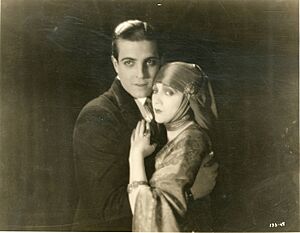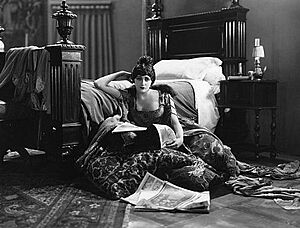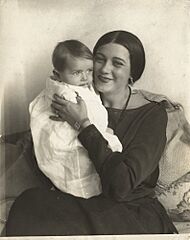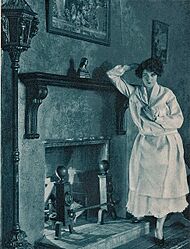Barbara La Marr facts for kids
Quick facts for kids
Barbara La Marr
|
|
|---|---|
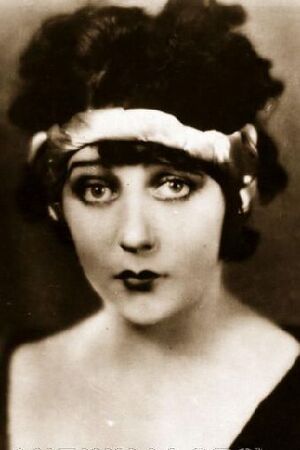
La Marr c. 1920s
|
|
| Born |
Reatha Dale Watson
July 28, 1896 Yakima, Washington, U.S.
|
| Died | January 30, 1926 (aged 29) Altadena, California, U.S.
|
| Resting place | Hollywood Forever Cemetery |
| Other names |
|
| Occupation |
|
| Years active | 1920–1926 |
| Spouse(s) |
Lawrence Converse
(m. 1914; died 1914)Philip Ainsworth
(m. 1916; div. 1918)Ben Deeley
(m. 1918; div. 1923)Jack Dougherty
(m. 1923) |
| Children | 1 |
Barbara La Marr (born Reatha Dale Watson; July 28, 1896 – January 30, 1926) was an American film actress and screenwriter. She appeared in twenty-seven movies between 1920 and 1926. People often talked about La Marr's great beauty. They even called her the "Girl Who Is Too Beautiful." She also had a very interesting personal life.
Born in Yakima, Washington, La Marr spent her early years in the Pacific Northwest. Later, her family moved to California when she was a teenager. She performed in vaudeville shows and worked as a dancer in New York City. After that, she moved to Los Angeles with her second husband. There, she became a screenwriter for Fox Film Corporation. She wrote several successful movies for them.
Douglas Fairbanks, a famous actor, "discovered" La Marr. He gave her an important role in The Nut (1921). Then, he cast her as Milady de Winter in his movie The Three Musketeers (1921). After two more successful films with director Rex Ingram, La Marr signed a deal to make movies for different studios. These included The Hero (1923) and Souls for Sale (1923). She even helped write some of these films.
During her career, La Marr became known as a "vamp" of the 1920s. This meant she played charming and mysterious women. She lived a very busy life. In 1924, La Marr's health began to get worse. This was partly due to very strict diets she tried for new movie roles. She passed away from serious illnesses at age 29. Later, she received a star on the Hollywood Walk of Fame for her work in movies.
Contents
Early Life and Beginnings
Barbara La Marr was born in 1896 as Reatha Dale Watson. Her parents were William and Rosana "Rose" Watson. They lived in Yakima, Washington. (La Marr later sometimes said she was born in Richmond, Virginia.) Her father worked as a newspaper editor. Her mother was from Corvallis, Oregon. She already had two older children from a previous marriage.
In the 1920s, Barbara's father became a vaudeville comedian. He used the stage name Billy Devore. The Watson family lived in different places in Washington and Oregon when Barbara was growing up. By 1900, she lived with her parents in Portland, Oregon. As a child, La Marr also danced in vaudeville shows. She first acted on stage in 1904. She played Little Eva in a play called Uncle Tom's Cabin in Tacoma.
By 1910, La Marr was living in Fresno, California, with her parents. Later, the family moved to Los Angeles. La Marr worked at a department store. She also performed in stage shows. In 1913, when she was 16, her half-sister took her on a car trip. After a few days, La Marr felt she was not allowed to go home. This event was reported in newspapers. La Marr's name appeared in headlines often over the next few years. In 1914, she returned to California from Arizona. She said she was the widow of a rancher named Jack Lytell. She also said she liked to be called "Beth," a childhood nickname.
Becoming a Star
Starting as a Writer
After marrying her third husband, Ben Deely, La Marr began writing movie scripts. She used the name Folly Lyell. She wrote many short scripts for Fox Film Corporation and United Artists. Many of these stories were based on her own life. She earned a lot of money for her writing, more than $10,000. She was given credit as a writer on films like The Mother of His Children and The Land of Jazz (all released in 1920).
La Marr also supported herself by dancing in different cities. She danced in New York City, Chicago, and New Orleans. Her dance partners included famous people like Rudolph Valentino. Her dancing even caught the eye of publisher William Randolph Hearst. He featured her in articles in the San Francisco Examiner newspaper.
Moving to Acting
While working as a writer, La Marr met Mary Pickford, a very famous actress. Pickford reportedly told her, "My dear, you are too beautiful to be behind a camera." She believed La Marr should be on screen. This led La Marr to return to Los Angeles and start acting. Her first movie was Harriet and the Piper in 1920. Even though it was a small role, people noticed her.
La Marr successfully became an actress with her role in The Nut (1921). She played a "femme fatale," a charming but mysterious woman. Later that year, Douglas Fairbanks hired her for a big role. She played Milady de Winter in The Three Musketeers.
Over the next few years, La Marr acted in many movies. She became known as "The Girl Who Is Too Beautiful." A newspaper writer, Adela Rogers St. Johns, gave her this nickname. It happened after a judge sent La Marr home because he thought she was too young and beautiful to be out alone. This publicity helped her career a lot. Some of her famous films include The Prisoner of Zenda and Trifling Women, both from 1922. These were directed by Rex Ingram.
In 1923, La Marr appeared in the comedy The Brass Bottle. She also had a supporting role in Strangers of the Night. A review in New York Times praised her "capable" acting. She starred in The Eternal City (1923) with Bert Lytell and Lionel Barrymore. The Italian leader Benito Mussolini even made a brief appearance in that movie.
Later Career and Health
In 1924, La Marr got her first main starring role in the movie Sandra. She filmed it in New York City. La Marr also helped write this movie. It was about a woman with a split personality. However, the movie did not get good reviews.
La Marr's last screenplay was called My Husband's Wives. It was released in 1924. After that, she made three more films: The Heart of a Siren, The White Monkey, and The Girl from Montmartre. While filming The Girl from Montmartre in late 1925, La Marr became very ill on set. She went into a coma. The studio finished the movie using a body double for her in some scenes.
Personal Life
Marriages and Family
Barbara La Marr was officially married four times. She sometimes claimed to have a first husband named Jack Lytelle, who she said died shortly after they married. However, there is no proof of this marriage.
Her first official marriage was in 1914 to a man named Max Lawrence. He turned out to be Lawrence Converse, who was already married with children. He was arrested for marrying La Marr under a false name. He died a few days later.
In 1916, La Marr married Philip Ainsworth, a dancer. He later went to prison for writing bad checks. They divorced in 1917. She married for a third time in 1918 to Ben Deely, also a dancer. They separated in 1921. Before her divorce from Deely was final, La Marr married actor Jack Dougherty in 1923. They separated a year later but remained legally married until she passed away.
Years after La Marr's death, it was revealed that she had a son named Marvin Carville La Marr. He was born in 1922. The father's name was never publicly shared. When La Marr became very ill, she asked her close friend, actress ZaSu Pitts, and Pitts' husband, Tom Gallery, to care for her son. After La Marr died, Pitts and Gallery adopted the boy. They renamed him Donald Michael "Sonny" Gallery. Donald Gallery passed away in 2014.
Health Challenges
La Marr lived a very busy life and often got very little sleep during her career. She once told an interviewer, "I cheat nature. I never sleep more than two hours a day. I have better things to do." Besides not sleeping much, La Marr also tried several very strict diets to lose weight in her last two years.
By late 1925, La Marr's health became much worse. She had pulmonary tuberculosis, a serious lung illness. While filming her last movie, The Girl from Montmartre, La Marr collapsed on set. In December, she was also diagnosed with nephritis, which is kidney inflammation. This was a complication of her tuberculosis. La Marr was in bed through Christmas. By late December, she weighed very little.
Passing Away
On January 30, 1926, Barbara La Marr passed away. She was 29 years old. She died from complications related to tuberculosis and nephritis at her parents' home in Altadena, California. Her friend, film director Paul Bern, was with her when she died.
La Marr's funeral in Los Angeles attracted over 3,000 fans. Many people were very sad. She was buried in a crypt at Hollywood Cathedral Mausoleum, in the Hollywood Forever Cemetery. For her important work in movies, La Marr has a star on the Hollywood Walk of Fame. You can find it at 1621 Vine Street.
Filmography
| Denotes a lost or presumed lost film. |
| Year | Title | Role | Notes |
|---|---|---|---|
| 1920 | Harriet and the Piper | Tam O'Shanter Girl | Credited as Barbara Deely Also known as Paying the Piper |
| Flame of Youth |
Story | ||
| The Mother of His Children |
|
Story Credited as Barbara La Marr Deely |
|
| Rose of Nome |
|
Story Credited as Barbara La Marr Deely |
|
| The Little Grey Mouse |
|
Story | |
| The Land of Jazz |
|
Story Credited as Barbara La Marr Deely |
|
| 1921 | The Nut | Claudine Dupree | |
| Desperate Trails |
Lady Lou | ||
| The Three Musketeers | Milady de Winter | ||
| Cinderella of the Hills |
Kate Gradley | Credited as Barbara La Marr Deely | |
| 1922 | Arabian Love |
Themar | |
| Domestic Relations |
Mrs. Martin | ||
| The Prisoner of Zenda | Antoinette de Mauban | ||
| Trifling Women |
Jacqueline de Séverac/Zareda | ||
| Quincy Adams Sawyer |
Lindy Putnam | ||
| 1923 | The Hero |
Hester Lane | |
| The Brass Bottle |
The Queen | ||
| Mary of the Movies | Herself | Incomplete | |
| Poor Men's Wives | Laura Bedford/Laura Maberne | Incomplete | |
| Souls for Sale | Leva Lemaire | ||
| Strangers of the Night |
Anna Valeska | Also known as Ambrose Applejohn's Adventure | |
| St. Elmo |
Agnes Hunt | ||
| The Eternal Struggle | Camille Lenoir | Also known as Masters of Women | |
| The Eternal City | Donna Roma | Incomplete | |
| 1924 | Thy Name Is Woman | Guerita | |
| The Shooting of Dan McGrew | Lou | ||
| The White Moth | Mona Reid/The White Moth | Writer, uncredited | |
| Hello, 'Frisco |
|||
| Sandra |
Sandra Waring | ||
| My Husband's Wives |
|
Story | |
| 1925 | The Heart of a Siren | Isabella Echevaria | Also known as The Heart of a Temptress |
| The White Monkey | Fleur Forsyte | Incomplete | |
| 1926 | The Girl from Montmartre | Emilia Faneaux |
Images for kids
See also
 In Spanish: Barbara La Marr para niños
In Spanish: Barbara La Marr para niños
- List of actors with Hollywood Walk of Fame motion picture stars
 | Ernest Everett Just |
 | Mary Jackson |
 | Emmett Chappelle |
 | Marie Maynard Daly |


